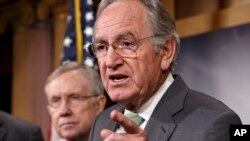CAPITOL HILL —
An effort to raise America’s national minimum wage has been blocked by minority Republicans in the U.S. Senate. The issue is the latest partisan skirmish between lawmakers as both parties position themselves for mid-term elections in November.
The minimum wage in America is $7.25 an hour, and has been since 2009. But the cost of living has continued to climb, eroding the purchasing power of low-wage workers. Democratic Senator Edward Markey said that must change.
“No person in America should work full time and not earn enough to be above the poverty level. Raising the minimum wage is a first step to fighting income inequality in our country,” said Markey.
Wednesday’s 54-42 vote was shy of the three-fifths required to begin Senate debate on a bill that would raise the minimum wage to $10.10 over the next two years.
Partisan disagreement
Republicans lined up in opposition to the measure. Senator John Cornyn argued higher wages make labor more expensive, which discourages employment.
“We all want to see hard-working American families work their way toward the American dream. But we are not going to be able to do that by the federal government setting wages for restaurants, small businesses and other people across the country,” said Cornyn.
Democrats disagree, saying a wage hike will boost consumer spending and provide a badly-needed lift to the economy.
That Democrats would press for a minimum wage hike and Republicans would block the bill has been known for months.
Most Democrats want to give low-wage workers a raise and are happy to force Republicans to go on record opposing it.
Before votes were cast, Senate Majority Leader Harry Reid said, “Millions of American workers will be watching how each senator votes today. And for Republicans, this vote will demonstrate whether they truly care about our economy.”
Eye on elections
Republicans, though, accuse Democrats of staging “show votes” to distract the American public from anemic economic growth recorded under President Barack Obama.
Senate Minority Leader Mitch McConnell responded to Reid. “Senate Democrats are pushing legislation today that would cost as many as a million jobs in this country. They seem to think they can coast on talking points and stale ideas,” he said.
Republicans face similar charges from Democrats in the Republican-led House of Representatives, where dozens of votes have been held to repeal Obama’s signature health care law.
While Republicans continue to shine a spotlight on Obamacare as a central campaign issue, Democrats have crafted a populist economic message in hopes of rallying the party’s base between now and November, when one-third of the Senate and all House seats will be contested.
Political observers expect Republicans to retain their majority in the House, but which party will control the Senate is -- at this point -- anyone’s guess.
The minimum wage in America is $7.25 an hour, and has been since 2009. But the cost of living has continued to climb, eroding the purchasing power of low-wage workers. Democratic Senator Edward Markey said that must change.
“No person in America should work full time and not earn enough to be above the poverty level. Raising the minimum wage is a first step to fighting income inequality in our country,” said Markey.
Wednesday’s 54-42 vote was shy of the three-fifths required to begin Senate debate on a bill that would raise the minimum wage to $10.10 over the next two years.
Partisan disagreement
Republicans lined up in opposition to the measure. Senator John Cornyn argued higher wages make labor more expensive, which discourages employment.
“We all want to see hard-working American families work their way toward the American dream. But we are not going to be able to do that by the federal government setting wages for restaurants, small businesses and other people across the country,” said Cornyn.
Democrats disagree, saying a wage hike will boost consumer spending and provide a badly-needed lift to the economy.
That Democrats would press for a minimum wage hike and Republicans would block the bill has been known for months.
Most Democrats want to give low-wage workers a raise and are happy to force Republicans to go on record opposing it.
Before votes were cast, Senate Majority Leader Harry Reid said, “Millions of American workers will be watching how each senator votes today. And for Republicans, this vote will demonstrate whether they truly care about our economy.”
Eye on elections
Republicans, though, accuse Democrats of staging “show votes” to distract the American public from anemic economic growth recorded under President Barack Obama.
Senate Minority Leader Mitch McConnell responded to Reid. “Senate Democrats are pushing legislation today that would cost as many as a million jobs in this country. They seem to think they can coast on talking points and stale ideas,” he said.
Republicans face similar charges from Democrats in the Republican-led House of Representatives, where dozens of votes have been held to repeal Obama’s signature health care law.
While Republicans continue to shine a spotlight on Obamacare as a central campaign issue, Democrats have crafted a populist economic message in hopes of rallying the party’s base between now and November, when one-third of the Senate and all House seats will be contested.
Political observers expect Republicans to retain their majority in the House, but which party will control the Senate is -- at this point -- anyone’s guess.




